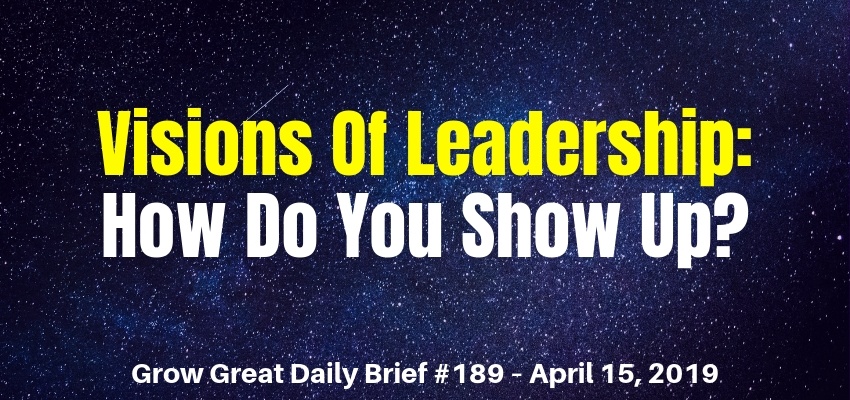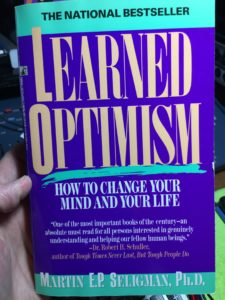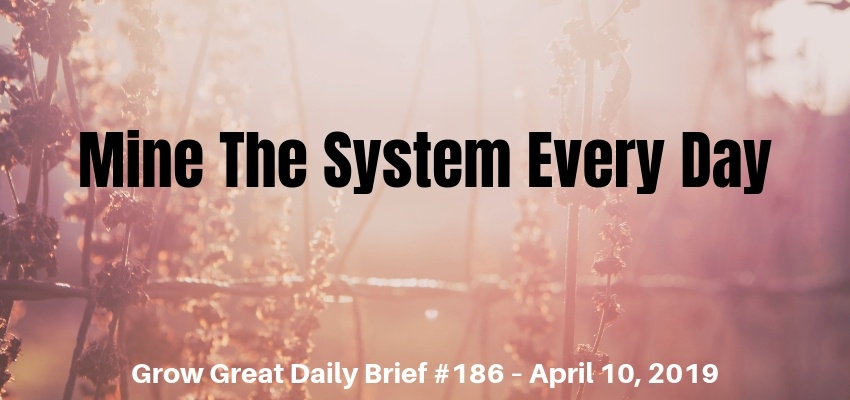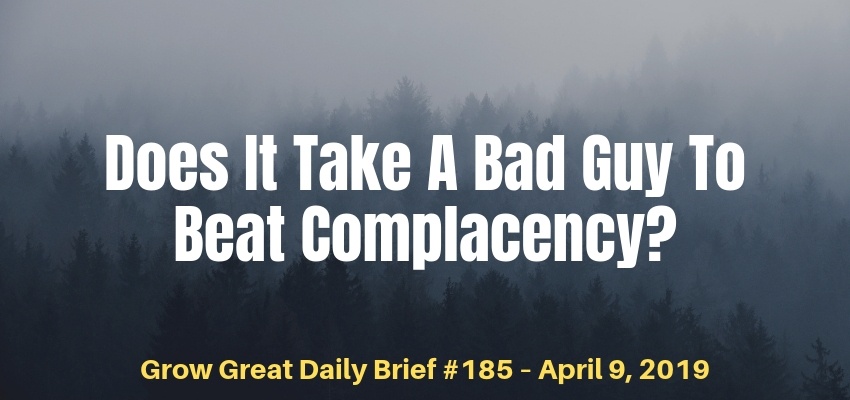Who Do You Need? – Grow Great Daily Brief #190 – April 16, 2019
Podcast: Play in new window | Download (Duration: 9:25 — 11.9MB)
Subscribe: Apple Podcasts | Spotify | RSS | More
Long-standing conventional wisdom among performance gurus tells us that the super achievers ask WHO not HOW. When facing an opportunity or challenge, I see the high value of asking who, but I also know the high value of asking how! Gurus love absolutes. Just more proof I suppose that I am NOT a guru! Although I do always buckle my seatbelt, keep my arms inside the rides at Six Flags and I never grab a dog by the ears. So there’s that!
Seriously, WHO is a great question for leaders. Is it the best question? Personally, I don’t think there is some secret question contest. I’m rather fond (as you well know) of lots of questions because I believe in the high value of curiosity.
But this is about YOU. It’s about you because you’re a leader. The paradox is that if you don’t work on your own personal growth, then your service to others will be more limited. It’s the stuff of growing great. You need to be great in order to help others achieve their own greatness. That’s what leaders do.
Do you have a growth plan for yourself?
Your daily life has a fairly intense focus on WHO. Even around your house. Who is going to fix that minor electrical problem with the house? Who is going to collect and carry out the trash? Who is going to rake those leaves?
You arrive at the office and the same question continues. Who is going to finish that analysis? Who is going to submit that report? Who is going to begin that project?
Today, we’re going to internalize the question and have you focus on the title question of today’s episode…
Who do you need?
It’s not who you need to do the tasks you need to be done. It’s who you need for your own personal and professional leadership growth.
Sometimes I encounter leaders who have never given it much thought. A few even arrogantly declare they don’t need anybody. Funny, but nobody ever says they accomplished success alone, without the help of anybody. We all readily admit others helped us along the way. And are still helping us.
Why then is it so difficult for some to soberly consider who they need to grow even more? I suppose a variety of things…like success, which can make some complacent. Or pride, which can make people refuse any sign of vulnerability.
We don’t have time to dive into all your personal issues that may prevent you from reaching out for the help you most need. Just know this, if you don’t ask – you don’t get. You know that’s true. So sit there being brave or courageous or whatever description you use to portray your hardheadedness. But you’ve got an awful lot of advantage to gain if you’ll just surrender to the truth that you need people around you to help you achieve more, to help you increase your self-awareness, to help eliminate your blind spots and to help you learn, understand and grow.
I can’t possibly know the exact answer of who you may need at this very moment. I just know you have the need because it’s universal for people intent on growing great.
What do you want to accomplish?
That’s for you to figure out. Please let me urge you to raise the bar. And that may lead to the first who. Somebody willing to challenge you and push you.
This doesn’t mean a combatant. It means somebody who understands you and your context enough to nudge you toward heights you may not even think are possible.
But who?
Somebody who believes in you. People who don’t believe in you can’t push you in the most positive ways. Only the people who know you well enough to have faith in your capacity can do this for you. You have a responsibility here in that you alone determine how well people get to know you. I know that restricts the population of people who may be able to do this. You’re not going to let just anybody get to know you in such an intimate way. Certainly not professionally. I get it.
But you need somebody with whom you can be completely candid, honest and open. I know it’s a tall order. That’s why so few CEOs and business owners leverage the advantage of people like that in their lives. I’m urging you to be exceptional and join the ranks of the very best operators in the world, the top leaders.
Who else?
It’s congruent with a person who has a deep belief in you and is able to challenge you to grow…but you also need a person who will encourage you. Everybody – including leaders – needs an encourager in their life. Somebody with the necessary willingness and ability to fully express that belief in us.
Sometimes it may be the same person who is able to nudge us forward with an appropriate challenge. But maybe not.
For years I’ve been fascinated at the behavior of little boys. Probably because I’ve been surrounded by so many of them. From coaching sports to raising a son, to having four grandsons. And I was once a little boy myself.
Showing off is not restricted to little boys – I’ve got a granddaughter who readily competes for attention all the time. But there’s something unique in how little boys want to show off especially to mom or grandmother. It’s that “hey look at me” thing. It’s how God wired us as males. Yes, Virginia men and women are different. I didn’t say better. I said DIFFERENT.
I have a Christian viewpoint. I believe in the creation story you read about in the book of Genesis. I also know the Bible commands wives to respect their husbands and for husbands to love their wives. It speaks directly to the knowledge God has in how He created us. He knows what we most need.
Little boys (and big ones, too) want respect, adoration, and praise. We want mom and grandma to brag on us. We crave their encouragement.
Yes, little girls (and bigger ones, too) want and need the same things. The little girls who have been in my life – and are still in my life – crave love, affection, and safety.
This isn’t a one or the other affair. It’s an AND kind of a deal. We all need and crave respect, adoration, praise, love, affection, and safety. The order of those can differ because we’re individuals.
People need encouragement. It’s a unique form of having somebody who truly believes in us. Who in your life provides that? Anybody?
Maybe there are other areas where you desperately need somebody…a who! Figure that out and find them. Don’t be bashful to solicit their help. Remember, if you don’t ask…you don’t get.
Be well. Do good. Grow great!
RC
Who Do You Need? – Grow Great Daily Brief #190 – April 16, 2019 Read More »





 It was written by one Martin E.P. Seligman, Ph.D. I knew I had to read it ’cause the author had TWO middle initials. E.P. stands for Elias Pete by the way. That actually had nothing to do with my buying the book, but I found it interesting nonetheless.
It was written by one Martin E.P. Seligman, Ph.D. I knew I had to read it ’cause the author had TWO middle initials. E.P. stands for Elias Pete by the way. That actually had nothing to do with my buying the book, but I found it interesting nonetheless. There’s a chapter about kids. On January 25, 1992 I had my two kids take an assessment contained in the book. My kids were both under the age of 12. I’ve still got their answers, written in their own handwriting. It’s proof of how interested I was in helping my kids grow up to be optimistic.
There’s a chapter about kids. On January 25, 1992 I had my two kids take an assessment contained in the book. My kids were both under the age of 12. I’ve still got their answers, written in their own handwriting. It’s proof of how interested I was in helping my kids grow up to be optimistic.
